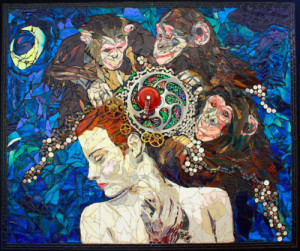THIS PAGE IS UNDER CONSTRUCTION
A Stage of Mind
When it comes to training of the mind, we have the choice of many analogies to work with. The puppy training analogy is good analogy for general use regarding the training of the mind. Another useful analogy is to use the screen or the stage of the mind, which represents your life as you see it. We can now use this analogy to analyze the process of creating a play or movie a little further. A good play or movie is well produced by directors, casting agents, lighting technicians and well acted by actors, according to good moral standards. The plot must be easy to follow and we expect some drama and conflict to make it interesting, but we always love a happy ending, as that satisfies the never-ending desire for happiness, joy and harmony (The Holy Grail).
What is the Monkey Mind?
In yoga books we often see references to the Monkey Mind. This is a term used for the mental chaos we experience from time to time, particularly when we have a lot to do or think about and feel pressure of time. The Monkey Mind is a state of experiencing stress due to disorganization. If we use the analogy of the mind as a stage, we now experience a play, in which the actors just randomly move around and say their lines, but not in the right order. The lighting technician has lost the plot and randomly turns spotlights on an off. Sometimes so often that he even creates a strobe effect. The mind simply cannot keep up with this constant change of focus and the whole story line of the play becomes lost. You haven’t got a clue what is going on and everything you see becomes disconnected and muddled up. This is the state of mind that is referred to as the ‘Monkey Mind’.
right order. The lighting technician has lost the plot and randomly turns spotlights on an off. Sometimes so often that he even creates a strobe effect. The mind simply cannot keep up with this constant change of focus and the whole story line of the play becomes lost. You haven’t got a clue what is going on and everything you see becomes disconnected and muddled up. This is the state of mind that is referred to as the ‘Monkey Mind’.
How do we deal with the monkey mind?
To find relief, we can stay with the stage analogy and start to take on the role of the light technician first. We need to shine the light on one subject at the time for as long as possible. We cannot reach a state of comprehension until we fully grasp each part of the play, each actor and each action in every detail. The mind is not designed to multi task. Once certain limit of multitasking has been reached, the mind loses focus and concentration and starts to take the Monkey Mind shape of total chaos. This limit and capacity of multi tasking varies from person to person.
Any chosen form of Mindfulness practice will create some stillness and relief from this chaos.
Indecision and the Committee of the Mind – Inner Chatter
In the ‘stage of mind’ we have a problem if the actors in the play need to discuss their script, and the division of their major and minor roles. Imagine now that our inner chatter represents such a committee meeting, which takes place inside our mind. We have all experienced situations in which we face internal conflict. On the one hand we think this, on the other hand ‘so and so’ might be better, but if something happens it may be better to do ‘blah blah’. A state of indecision is stressful for anyone.
be better, but if something happens it may be better to do ‘blah blah’. A state of indecision is stressful for anyone.
By using our awareness, we may be able to listen to and identify each of the actor’s voices.
Who are these actors or committee members? Most members appear to be negative. It seems that we all give ourselves a much harder time than we give others. Some voices are very ‘hard wired’ and have been with us for a long time. It is not easy to identify each voice and to find out how it came into the committee, and it takes even more work to get rid of the voices that have been there for a while. But one thing is certain, each voice was born due to the catastrophising quality of the mind.
- The Blame Shifter – It is So And So’s fault, I couldn’t help it. I didn’t have the right tools. Nobody told me, it’s not my fault
- The Fraudster – or self-sabotager. This is the voice that creates self-doubt and tells you that you are not good enough. This may lead to you no longer pursuing a goal you wanted to.
- The Pessimist – It can’t be done. It won’t work. It is not possible. I don’t want to do. I can’t do it. It can’t be done.
- The Victim – This always happens to me. I am hopeless. I can’t do anything right. I just don’t get it. I deserve better. Feeling powerless.
- The Self-Sabotager – I stuffed up, so I may as well give up. I can’t be bothered anymore.
- Procrastinator – This voice is leading you to distractions. Like the Fraudster, you are not sure if you are up to doing a difficult task and you do anything else to avoid the challenge. You are not giving up, but your anxiety builds as the deadline comes near.
- The Whinger – I wish it was not like this. I wish it to be different. Wanting the impossible.
- Our Stubborn voice says: I want things my way, Don’t listen to anyone else, I know what I am doing.
The members who we would like to invite to the table are:
- The Optimist / trust – You have worked hard enough, you can do it. Give it a go. Try it. You learn from your mistakes. It will work out somehow.
- The Realist or Wise One/ Objective and non-judgmental – lets look at this realistically. I will pretend to be a stranger and observe what has happened. No judgement, just the facts. Look at the situation with the largest perspective. How does it fit in the rest of the world.
- The Compassionate One/open and kind – being able to accept mistakes, gives praise where praise is due. Always reasonable and open to new ideas.
The main key to creating order and moving towards a decision is Acknowledgement. Ignoring annoying committee members only makes them louder. It is best to look at the meeting from the outside. Imagine looking through a window, but you are still able to listen in. Acknowledge also that you gave each committee member permission to be there.
What are the antidotes to dealing with these voices:
We need to acknowledge our negative sides. We may also be able to see how our inner chatter is not only dependent past experiences and fears, but also on our current mood.
